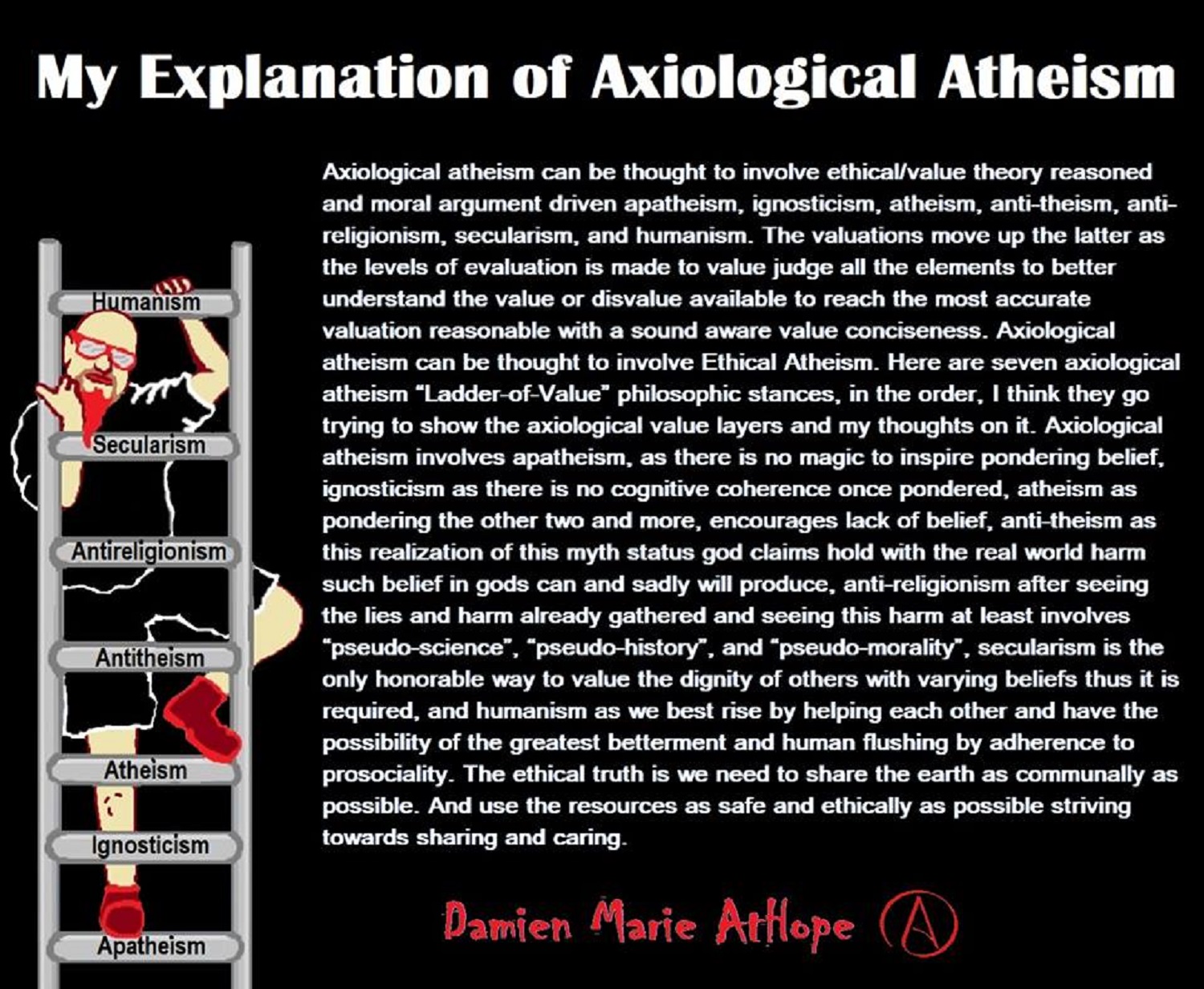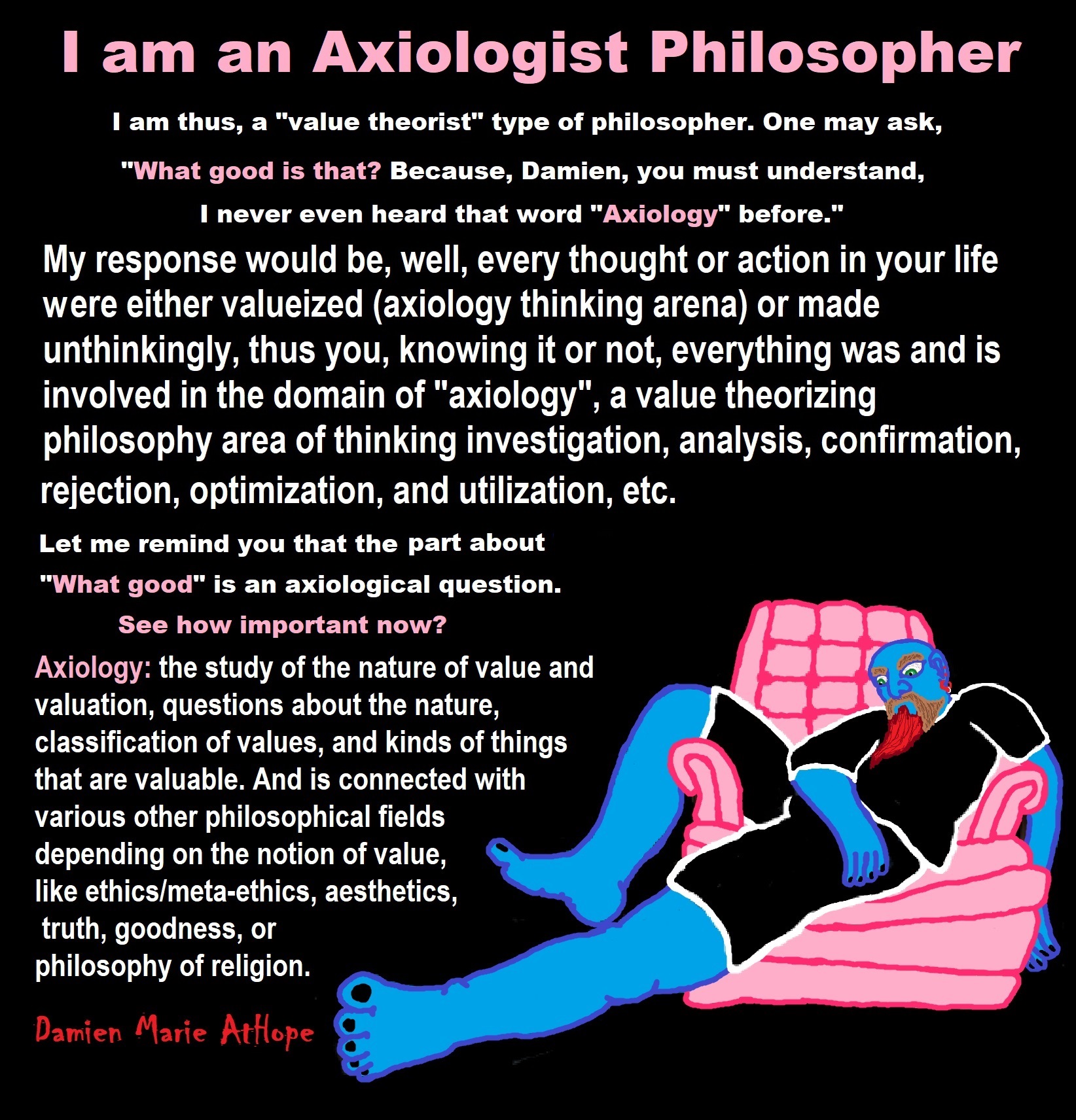
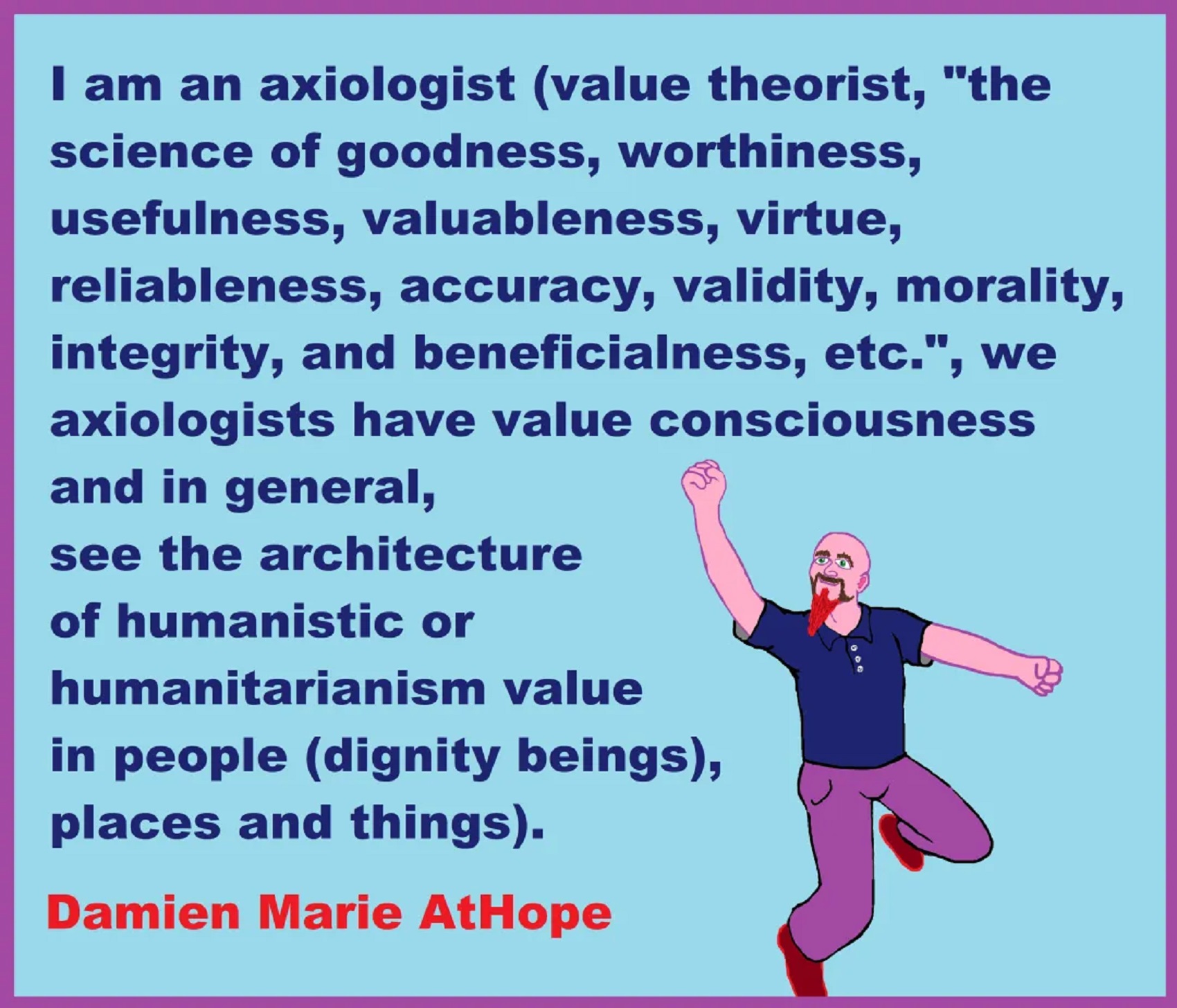
I Am An Axiological Atheist?
My Atheism: “Axiological Atheism”
As a Ignostic Atheist I reject that even the term god has any valid coherent meaning outside myths. Ignosticism, or igtheism is a theological position that is similar to theological non-cognitivism which views religious language as not cognitively meaningful or connected to atheological thinking in general which is opposed to theology; thus is atheistic by default. If followed to its logical end Ignostic thinking concludes that the entire question about God’s existence is a non-question and that feeling a requirement to take a yes, no or even ambivalent position is absurd. Ignostic thinking is based on an expectation of strong critical rational analysis of any proposition including the existence of the god concept. As with any topic, and especially in the realm of the supernatural and woo, the subject of any debate should be coherently defined. If one offers a clear definition of an entity, then in order to take a position whether it exists or not the definition of the entity must be one in which its existence can be falsified (there is a rational and logical method by which we can test the existence of the subject as it has been defined). Few if any theists ever offer a clear definition of their god concept other than faith in myths. The few who do offer a definition of what a god concept could involve almost never offer one in which the existence of that such a god concept could be tested. The rare if ever falsifiable definition offered regarding some believed god’s existence is easily falsified. And so as with any subject (such as the existence of almost all supernatural entities) debate about the existence of God is, for the far majority of such conversations, pointless.
Axiological Atheist Interviews
Axiological Atheist “Damien” Live at 25 MeetUps: Atheist Reality TV
Truth Navigation: Techniques for Discussions or Debates
How Do I Gain a Morality Persuasion or Make a Change to it?
Axiological atheism: is the thinking that no god(s) or goddess(es) exist and they lack all worth and value to humans even if they existed. Such myth should be rejected in favor of believing in humanity, seeing secularism and humanism as a kind of “higher absolute” such as humanity, formal axiology, or naturalistic or universal ethical principles. My stating a kind of “higher absolute” is not stating a belief in some absolute morality, instead it is meaning nothing but naturalistic human centered morality is used or forms of valued good is derived from a rational thinking by humanity (Ie. humanity as the absolute source of ethics and values, and permits individuals to resolve moral problems without resorting to god myths or religious philosophies). I am anthropocentric as an Axiological Atheist. I see humans value as above all other life’s value. Some say well, we are animals so they disagree with my destination. But how do the facts play out? So you don’t have any difference in value of life? So a bug is the same as a mouse, a mouse is the same as a dolphin, a dolphin is the same as a human, all to you have exactly the same value? You fight to protect the rights of each of them equally? And all killing of any of them is the same crime murder? I know I am an animal but you also know that we do have the term humans which no other animal is classified. And we don’t take other animals to court as only humans and not any other animals are like us. We are also genetically connected to plants and stars and that still doesn’t remove the special class humans removed from all other animals. A society where you can kill a human as easily as a mosquito would simply just not work ethically to me and it should not to any reasonable person either. Anthropocentrism (from Greek ánthrōpos, “human being”; and kéntron, “center”) the belief that considers human beings to be the most significant entity of the world and interprets or regards the world in terms of human values and experiences. An axiological atheist could be thought of as thinking no gods no masters and thus would never worship a god or any being especially if it was by threat, force or the act of coercing to any extent. An axiological atheist may even question if any being is worthy of the title god or be ignostic that every theological position assumes too much about the concept of god and see this as extending to other theological concepts; including (but not limited to) concepts of faith, spirituality, heaven, hell, afterlife, damnation, salvation, sin and the soul. Thus regarding that as ridiculous and not worthy at all and should be shown Ridicule and Disdain. Faith is Not Evidence of Reality
Axiological/axiology (value theory/value science) Atheism?
Axiological Ethics not Pseudo Morality
Therefore as you can guess they would say we are better off that no god(s) or goddess(es) existed and it would be much worse if they did. Organized Atheism as some call it, is what we make it and many do a lot of good and are of benefit by pushing this positive narrative flooding out negative narratives (sexism, racism, homophobic or transphobic, etc.). I am a caring firebrand atheist, wishing to be hard on ideas but strive to be kind to people. I wish to show we can be strong atheists and in my case antitheist and antireligionist too but with the promotion of care and kindness as well. As much as there are atheists who should be called out for bringing things down, I feel we should praise and support the ones who help bring it up as well. Applying Axiological Thinking
Debunking both Positive (HEAVEN) and Negative (HELL) near death experiences.
Challenging Agnosticism Assumptions
As an Axiological Atheist, I wish for Human flourishing
Axiological atheism: axiological attitudes toward God’s existence are axiological theism (thinking God’s existence to be a good thing), axiological atheism (thinking God’s existence to be a bad thing) and axiological agnosticism (indifference toward God’s existence). Issues in the Philosophy of Religion an axiological approach
Truth is a Value (axiological) Judgment.
When would skepticism NOT be reasonable?
Axiological atheism: (Ethical/Value theory Reasoned and Moral Argument driven) Atheism, Anti-theism, Anti-religionism, and Secular Humanism: Atheist Morality = Scientific Morality?
“Value Theory/Value Science” atheism: AXIOLOGICAL ATHEISM
As such axiological atheism’s ethically reasoned antitheism & antireligionism is constructive and pro-humanity. We who believe we are thinking rational, leading to opposition or hate of religion may that be limited to the nonfactual or oppressive ideology and not the people. Beyond just not being something lets be something, rational thinking should challenge myths but also prove our love for humanity and care for all living beings. In most cases, Axiological atheism would assert the traditional concept of “Atheism” answers only a single question: Is there a creator god or not? That is an important question, but if your answer is “no”, it is only a starting point and not a way of life. Hell claims debunk LOVING gods?
Interview of Formal Axiological Atheist Dr. William Kelleher
You may have reached that viewpoint based on your respect for logic, evidence, science,and personal experience which too are vital values. Yet, after you have reached that initial “no god” answer, all the other important questions in life, all the options for mental and emotional wholeness and social and environmental harmony, ethics and morality, personal fulfillment, social values, philosophy, and psychology remain open. That is where “Axiological Atheism” holds a connection to both further challenging the god concept and devaluing religion and adding a value meaning and ethical axiological ideology to guide universally desirable secular ethical way of being or a value-driven life lived in this reality. Axiological Atheism not Nihilist Atheism
Chastised in a Message on My Axiological Atheist Page & My Responses
What is Axiology, Formal Axiology & Axiological Profiling?
My quick definition of Axiology and Axiological Atheism?
Axiology is the name for “value theory.” It is derived from the Greek word “axios” meaning “worth.” Formal axiology is the logic-based science of value anchored in a “hierarchy of meaning” from the most meaningful or richest value to the most destructive or greatest value loss. The logic specifies 18 different levels of richness. Hartman’s “hierarchy of value” is the mathematical measuring standard for human evaluative judgment and decision-making in life and in all social sectors of life in our culture. When people make value judgments, they use both their mental and emotional capacities to arrive at their decision. Some people have very solid and reliable decision-making abilities – while others routinely make wrong or inaccurate choices. Axiological profiles measure the quality of the respondent’s judgment and decision-making by gauging both their mental clarity and their emotional orientation & conditioning.
Real Morality: Emotional Shame?
Damien What are some of the books you have read?
Axiological Atheism, is Intellectualism
Formal Axiology (Scientific Axiology/Scientific Value Theory) takes a realistic, or fact-based, view of the world when assessing or understanding value/good/worth. Formal axiology understands that people have and act upon values. Scientific axiologists will seek to understand what those values are, and to analyze their structure. That empirical orientation is why scientific axiology can serve as the formal side of the yet to be developed value sciences. To illustrate this value realism, suppose a theist states they love god(s). Since the science of value has an empirical orientation, a value scientist would see the theistic belief in god(s) not as some actual existing being, instead, understand it as a conception in the mind of theist not anything realistic or fact-based. Ref
Seeing Bigfoot as real, is a foot in the mouth.
Dr. Leon Pomeroy in his book, The New Science of Axiological Psychology (Pomeroy, 2005), has shown that formal axiology is also empirically valid. Thus, in our axiological assessment profiles we have the solid support of both scientific methods: the deductive logic-based axiomatic method and the inductive, empirical method. Dr. Pomeroy spent over 20 years collecting statistical data for his book cross-nationally, from numerous and diverse eastern and western countries and cultures, and proving that cultures all over the world make value judgments in the same way.
Moral fear and Moral love (which together motivate my axiological ethics)?
Self-ownership, Human Rights, and Societal Liberty or Freedoms
Neuro‐Axiology: merges Neuroscience understanding how the brain works with Axiology’s formal science that makes possible the objective measurement of value how humans make value judgments. (You will ALWAYS choose what you think adds the MOST value to your life.) Accepting the standard of a neuroscientific model of consciousness means that everything we think, feel, remember, and do is a function of the brain. This includes the emotion of empathy. We are not empathic because it makes sense to be empathic – meaning that most humans don’t simply reason their way to empathy. Nor do we simply learn empathy (although brain development is an interactive process with the environment, so we can’t rule out environmental influences). For the most part, we have empathy because our brains are wired with empathy as a specific function. My Kindness is more Cognitive Empathy, not as much Emotional Empathy
T.R.U.E. “The Rational Universal Ethics”
Axiological Dignity: “Value Consciousness vs Value-Blindness”
Like every function of the body you can think of, if it is not essential for survival then some subset of the human population likely has a disorder or even absence of this function. We recognize the biological limits of empathy or absence of empathy as the disorder, psychopathy. It is estimated that about 1% of the general population are psychopaths, while about 20-30% of the US prison population. Dr. Robert S. Hartman discovered that people hold back a 40% latent reserve of cooperation and productivity until they have been valued as human beings. Axiology is the science of how humans value and make value judgments as well as how they relate to ethics (not moral values often religious or culture relative). Atheist for Non-Aggression
Axiological Dignity Being Theory
The basics of Axiology are in its 3 Classes of Value and 6 “Advisors”.
The following are the Classes of Value:
1. Systemic: plans, rules, best practices, procedures; ideas or expectations
2. Extrinsic: practical or situational; measurable, tracked; tasks (tangible)
3. Intrinsic: personal or transcendent; infinitely valuable; irreplaceable; human beings (intangibles)
Two Atheists philosophers: debate “spiritual”
Why do people think Religion is much more than supernaturalism and superstitionism?
The following are the 6 Advisors which consist of 2 views of one inward and one outward and one must remember people are neither their thoughts nor their advisors.
1. World View: Empathy-Intuition “people”, Practical Judgment “tasks, & Systems Thinking “plans & ideas”
2. Self View: Self-Esteem “who you are”, Role Awareness “what you do,” & Self Direction “where you go”.
Explaining Axiological theism, Axiological agnosticism, and Axiological atheism
Justice in the Workplace: morality/ethical dimensions
The word “Axiological” (to the term “Axiological atheism” is meant to denote an atheistic “Value” rejection of the existence of gods or supreme beings and in favor of a “higher absolute” such as humanity or universal ethical principles. The perception of moral obligation removed from ethical sensitivity to universal justice [is] thus unintelligible as “higher absolute”. As a form of atheism, Axiological favors humanity as the absolute source of holistic ethics and care values which permits individuals to resolve moral problems without resorting to a god’s moral obligation which is anti-humanity and not needing to connect to equal justice. Axiological Atheism can be seen as ethically reasoned antitheism and antireligionism where it is all about axiology values that underlie the universal truths. A few examples of universal truths such as there is no such thing as just rape, no honorable thoughtful unwanted torture, and no just humanistic caring abuse of the innocent. You can offer excuses but the true values violations hold true. Axiologists are broadly concerned with all forms of value including aesthetic values, ethical values, and epistemic values. In a narrow sense, axiologists are concerned with what is intrinsically valuable or worthwhile—what is desirable for its own sake. All axiological issues are necessarily connected to ontological and epistemological assumptions.
Axiology in Axiological Atheism can be seen as applying science of morality, referring to its ethically naturalistic views basing morality on rational and empirical consideration of the natural world. The idea of a science of morality has been explored by writers like Joseph Daleiden in The Science of Morality: The Individual, Community, and Future Generations or more recently by neuroscientist Sam Harris in the 2010 book The Moral Landscape. Harris’ science of morality suggests that scientists using empirical knowledge, especially neuropsychology and metaphysical naturalism, in combination with axiomatic values as “first principles”, would be able to outline a universal basis for morality. Harris and Daleiden chiefly argue that society should consider normative ethics to be a domain of science whose purpose amounts to the pursuit of flourishing (well-being). “Science” should not be so narrowly defined as to exclude important roles for any academic disciplines which base their conclusions on the weight of empirical evidence. The term “science of morality” is also sometimes used for the description of moral systems in different cultures or species.
Atheist, Antitheist, and Antireligionist
The axiological movement emerges from the phenomenological method. The axiologists sought to characterize the notion of value in general, of which moral value is only one species. They argue against Kant, that goodness does not exclusively derive from the will, but exists in objective hierarchies. They emphasize the extent to which it is through emotions and feelings that human beings discern values. The notion of right action is understood derivatively in terms of the values which emotions reveal. Evolutionary psychology seems to offer an account of the evolution of our “moral sense” (conscience) that dispenses with any reference to objective values. Its apparent elimination of objective values on the grounds of their being unneeded in explanation has led the skeptical writings of J.L. Mackie and Michael Ruse. By contrast, Robert Nozick has resisted this interpretation of evolution (1981) arguing that an evolutionary account of the moral sense can no more dispense with values than an evolutionary account of perception can dispense with perceptual objects objectively present in the world. Axiologists in contemporary ethics are Platonists such as Iris Murdoch and Neo-Kantian theorists such as John Rawls and Robert Nozick.
How Did You Become Atheist, Damien?
Tenets of Secular Ethics
Despite the width and diversity of their philosophical views, secular ethicists generally share one or more principles:• Human beings, through their ability to empathize, are capable of determining ethical grounds.• Human beings, through logic and reason, are capable of deriving normative principles of behavior.• Human beings have the moral responsibility to ensure that societies and individuals act based on these ethical principles.• Societies should, if at all possible, advance from a less ethical, less empathy, and unjust form to a more ethical, more empathy and just form.
Addressing “ATHEISM”, reasons for it and its possible types/styles
Many of these tenets are applied in the science of morality, the use of the scientific method to answer moral questions. Various thinkers have framed morality as questions of empirical truth to be explored in a scientific context. The science is related to ethical naturalism, a type of ethical realism.
Hammer of Truth: Yes, you too, have lots of beliefs…
The problems of axiology fall into four main groups, namely, those concerning (1) the nature of value, (2) the types of value, (3) the criterion of value, and (4) the metaphysical status of value.
(1) The nature of value experience. Is valuation fulfillment of desire (voluntarism: Spinoza, Ehrenfels), pleasure (hedonism: Epicurus, Bentham, Meinong), interest (Perry), preference (Martineau), pure rational will (formalism: Stoics, Kant, Royce), apprehension of tertiary qualities (Santayana), synoptic experience of the unity of personality (personalism: T. H. Green, Bowne), any experience that contributes to enhanced life (evolutionism: Nietzsche), or “the relation of things as means to the end or consequence actually reached” (pragmatism, instrumentalism: Dewey).
(2) The types of value. Most axiologists distinguish between intrinsic (consummatory) values (ends), prized for their own sake, and instrumental (contributory) values (means), which are causes (whether as economic goods or as natural events) of intrinsic values. Most intrinsic values are also instrumental to further value experience; some instrumental values are neutral or even disvalued intrinsically. A few recognized as intrinsic values are the (morally) good, the true, the beautiful, and the holy. Values of play, of work, of association, and of bodily well-being are also acknowledged. Some (with Montague) question whether the true is properly to be regarded as a value, since some truth is disvalued, some neutral; but love of truth, regardless of consequences, seems to establish the value of truth. There is disagreement about whether the holy (religious value) is a unique type (Schleiermacher, Otto), or an attitude toward other values (Kant, Höffding), or a combination of the two (Hocking). There is also disagreement about whether the variety of values is irreducible (pluralism) or whether all values are rationally related in a hierarchy or system (Plato, Hegel, Sorley), in which values interpenetrate or coalesce into a total experience.
(3) The criterion of value. The standard for testing values is influenced by both psychological and logical theory. Hedonists find the standard in the quantity of pleasure derived by the individual (Aristippus) or society (Bentham). Intuitionists appeal to an ultimate insight into preference (Martineau, Brentano). Some idealists recognize an objective system of rational norms or ideals as criterion (Plato, Windelband), while others lay more stress on rational wholeness and coherence (Hegel, Bosanquet, Paton) or inclusiveness (T. H. Green). Naturalists find biological survival or adjustment (Dewey) to be the standard. Despite differences, there is much in common in the results of the application of these criteria.
(4) The metaphysical status of value. What is the relation of values to the facts investigated by natural science (Koehler), of Sein to Sollen (Lotze, Rickert), of human experience of value to reality independent of man (Hegel, Pringle-Pattlson, Spaulding)? There are three main answers: subjectivism (value is entirely dependent on and relative to human experience of it: so most hedonists, naturalists, positivists); logical objectivism (values are logical essences or subsistences, independent of their being known, yet with no existential status or action in reality); metaphysical objectivism (values — or norms or ideals — are integral, objective, and active constituents of the metaphysically real: so theists, absolutists, and certain realists and naturalists like S. Alexander and Wieman).
Trying to Help Promote Knowledge: Philosophy and Science.
Axiological atheism can be seen as antitheist and takes a very strong unsympathetic line by saying no being, of any sort, is worthy of the name of god and demanding worship a “moral obligation,” to his values alone which demonstrates an axiological disapproval of their value to be worshipped. No being deserves to be god because they have not provided irrefutable proof nor have done anything to prove separation from the natural world which all beings are part of.
Pragmatic Ethical/Axiology Driven Assumptions, Overcome the Weight of Solipsism Doubt
Morality is a biological adaptation. It is likewise natural as fully detailed in the book “The Moral Lives of Animals” where morality or ethical conscience is an evolutionary persuasion seen in how wild elephants walking along a trail stop and spontaneously try to protect and assist a weak and dying fellow elephant. As well as in how laboratory rats, finding other rats caged nearby in distressing circumstances, proceed to rescue them. A chimpanzee in a zoo loses his own life trying to save an unrelated infant who has fallen into a watery moat. The examples above and many others, show that our fellow creatures have powerful impulses toward cooperation, generosity, and fairness. Yet, it is commonly held that we Homo sapiens are the only animals with a moral sense. This rigorous challenges that notion and shows the profound connections—the moral continuum—that link humans to many other species. Understanding the moral lives of animals offers new insight into our own.
Truth Navigation and the fallacy of Fideism “faith-ism”
Since the god concept in axiological atheism can only be likewise conceived as natural, it deserves no more value than a tree, human, or a black hole, if it was true. If the god concept is outside of nature, it has demonstrated no relevance or worth to the obviously natural world. If the god concept was outside of nature but found relevant over nature, it would be shown to be either willfully guilty for allowing harm or the direct creation of the harm. If the god concept was demonstrated as an outsider to the natural world with no ability to manage harm in every stance, it would thus be valueless and undesirable to be given praise and actually shown contempt.
When you say “GOD,” what do you mean by god?
Beyond simply taking the stance that we know, as Atheists, gods do not exist; axiological atheism further strives from just evolution and shows that a creator and designer are not needed to explain life. Axiological atheism ethically critiques, value judge analyzes, and attack anything that we might be missing out on to remove belief that a god real or concept would be something of value seeing gods as oppressive moral monsters. Axiological atheism can also be seen as a form of antitheist and anti-religionist viewing the negative axiological difference that goddess/gods or religion’s existence makes in a world. Because “fact” symbolizes objectivity and “value” suggests subjectivity, the relationship of value to a fact is of fundamental importance in developing any theory of the objectivity of axiological value and of value judgments understands “Axiological atheism” as an axiological protest to the existence of gods or supreme beings.
“god is Nothing but a Factless Myth Held in an Invisible Box”
Axiological atheism is anti-theist challenging the slandered thinking that god gives or has morality or is a moral being, exposing instead that such a belief is wrongly based on a premise (a hypothesis) that does not stand up to testing. Axiological atheism is anti-religionist challenging the slandered thinking that religion gives or has morality, exposing instead that such a belief is wrongly based on a premise (a hypothesis) that does not stand up to testing.
Methodological Rationalism (Ontology, Epistemology, & Axiology) and Skepticism
Axiological atheism is a branch of atheism that is also called constructive atheism: looks to science, humanity, and nature as the only viable source of ethics, morals, and values. These axiological atheists say that humans know what is morally right or wrong, inherently due to evolution which can also be seen in lesser forms of animal life with cognitive abilities demonstrating the rational rejection that its existence is only attributed to the myths of gods or supreme beings creation. Axiological atheism value view goes beyond Nietzsche’s comment that “god is dead” with the ethical opinion that god deserved to die.
Axiology, Morality and the Dignity Being: “Human Entity”
Therefore, axiological atheism’s stance on a being in most faiths and the actions claimed of the imaginary being can be attributed to such atrocities, unfairness, injustices, and selfish/self-serving distortion of values. If there were such beings as gods, they are deserving of a life sentence in prison, the death penalty, or at least to be rebuked and shunned as an anti-humanist.
Axiological atheism holds judgmental axiological attitudes towards the existence of gods if there was even such myths, that is to say between an interest in grounds for positioning the existence of god or a god concept as harmful and desires to expose the negative orientations or evaluative reason for believing in god and religion and why they should have no value but do deserve to disdain. For some unbelievers, an axiological atheism stance would be a drastic position because it sees little necessity of disproving a god’s existence. However, sees no value in a god at all, even if one was true, and devalues the concept so fully that the preference would be that it be non-existent. If one was found to be real and would wish to do away with the very flawed god concept altogether to remove its harm to humanity.
Reason, Morality, and Emotions?
The claim of hell are ridiculous and immoral, not just false.
Axiological atheism makes sense mainly on the assumption that believers have a distorted or inadequate concept of god and the violations to a just caring ethical humanity such a concept would be. Axiological atheist inquiry focuses on what a person values, finds desirable, or concern themselves with how a god is wrongly perceived or conceived as positive. Axiology to the philosophy of disbelief asks whether the existence of god (conceived in a particular way) would be a good or a bad thing, welcome or unwelcome. The axiological attitudes toward a god’s existence such as axiological atheism that thinks a god’s existence to be a very bad thing and axiological agnosticism is the indifference toward a god’s existence.
On the Nature of Value (axiology)
Axiological atheism (Video 1, Video 2)
I Damien Marie AtHope am an Axiological Atheist.
Formal Axiology: Another Victim in Religion’s War on Science
My Strongest Explicit Atheism “positive” / “strong” / “hard” atheists similar to Antitheist Atheism.
Atheistic Null Hypothesis: There is no God/Gods
I am a caring firebrand atheist, wishing to be hard on ideas but kind to people.
My life; the good, the bad, and the ugly on the road to the Mental Freedom of Atheism
I Believe Archaeology, not Myths & Why Not, as the Religious Myths Already Violate Reason!
Archaeological, Scientific, & Philosophic evidence shows the god myth is man-made nonsense.
I am not the thing abuse made, I am a shooting star blazing bright, shining far pass my past.
Psychological certainty and Epistemic certainty?
Losing My Religion and MY Faith Addiction
god Claims are a Non-Reality Commodity
My Blogs on the Evolution of RELIGION
If you think you believe in a god, “what do you mean by god,” saying a name tells me not one thing about the thing I am asking to know “its” beingness/thingness/attributes/qualities. Thus, what is the thing “god” to which you are talking about and I want you to explain its beingness/thingness/attributes/qualities? Religious/theistic people with supernatural beliefs often seem as though they haven’t thought much about and that is something we can help using ontology questions about the beingness/thingness/attributes/value qualities they are trying to refer too. What do you mean by god, when you use the term god? And, I am not asking you for the name you attach to the thing you label as a god. I don’t need to know what the god you believe is known “by.” I am asking, what is the thing you are naming as a god and what that thing is, its qualities in every detail like all things have if they are real. Are you just making stuff up or guessing/hoping or just promoting unjustified ideas you want to believe, what is a god?
Damien, is it possible, there’s a God you haven’t considered?
Do you want what is true or want what you believe without concern for what may actually be true?
Child Religion Freedom Rights Violations?
Religion harm and a way to stop it’s Rights Violations?
Religion and it’s god myths are like a spiritually transmitted disease of the mind. This infection even once cured holds mental disruption which can linger on for a lifetime.
I hate the us vs them dichotomy, so let me do just that, claiming not to.
How to best Help change the current value of Religion Freedom Rights over Child Rights?
If axiology is a value-based ethics system, how are the ethical values established?
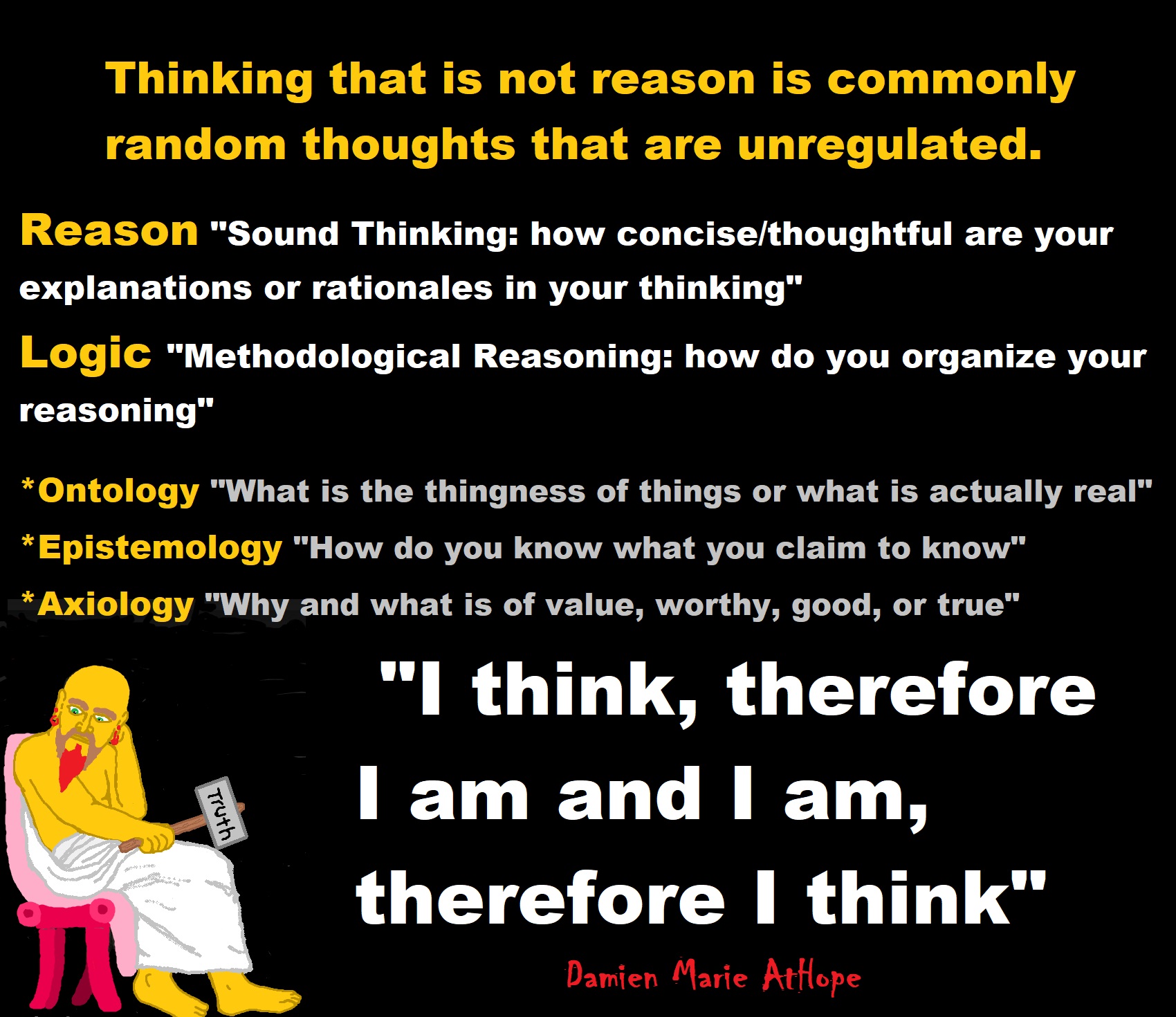
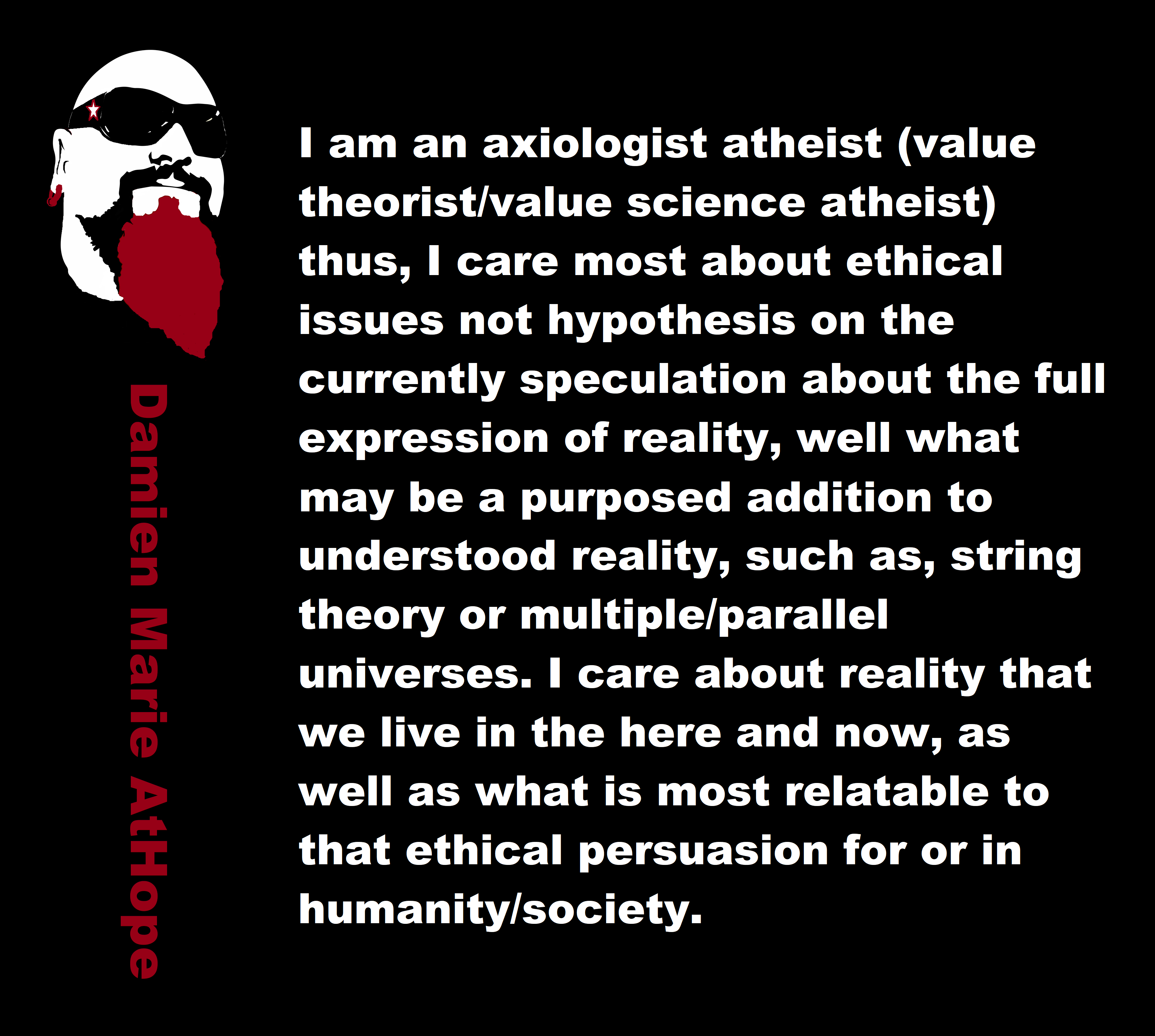
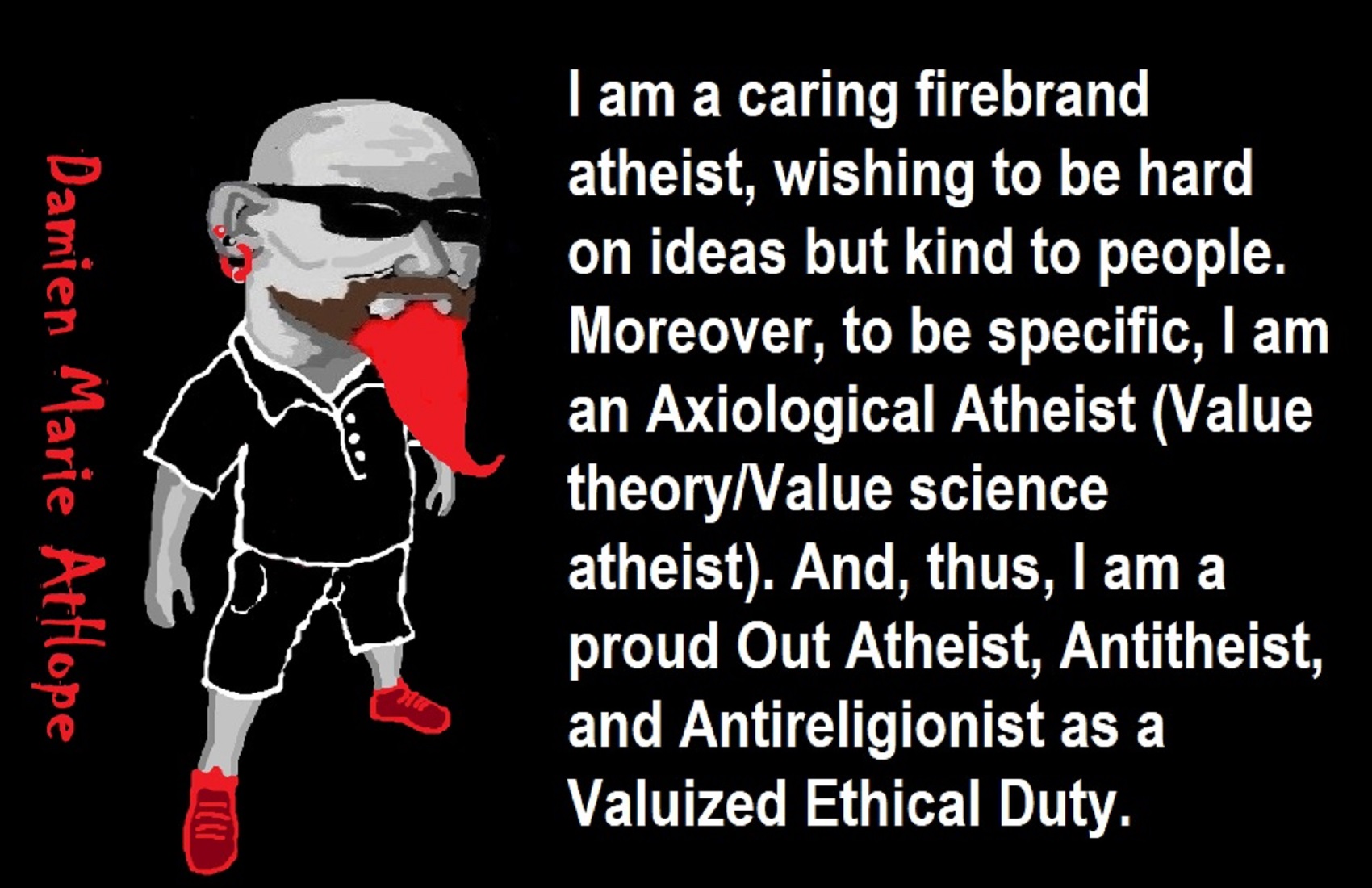
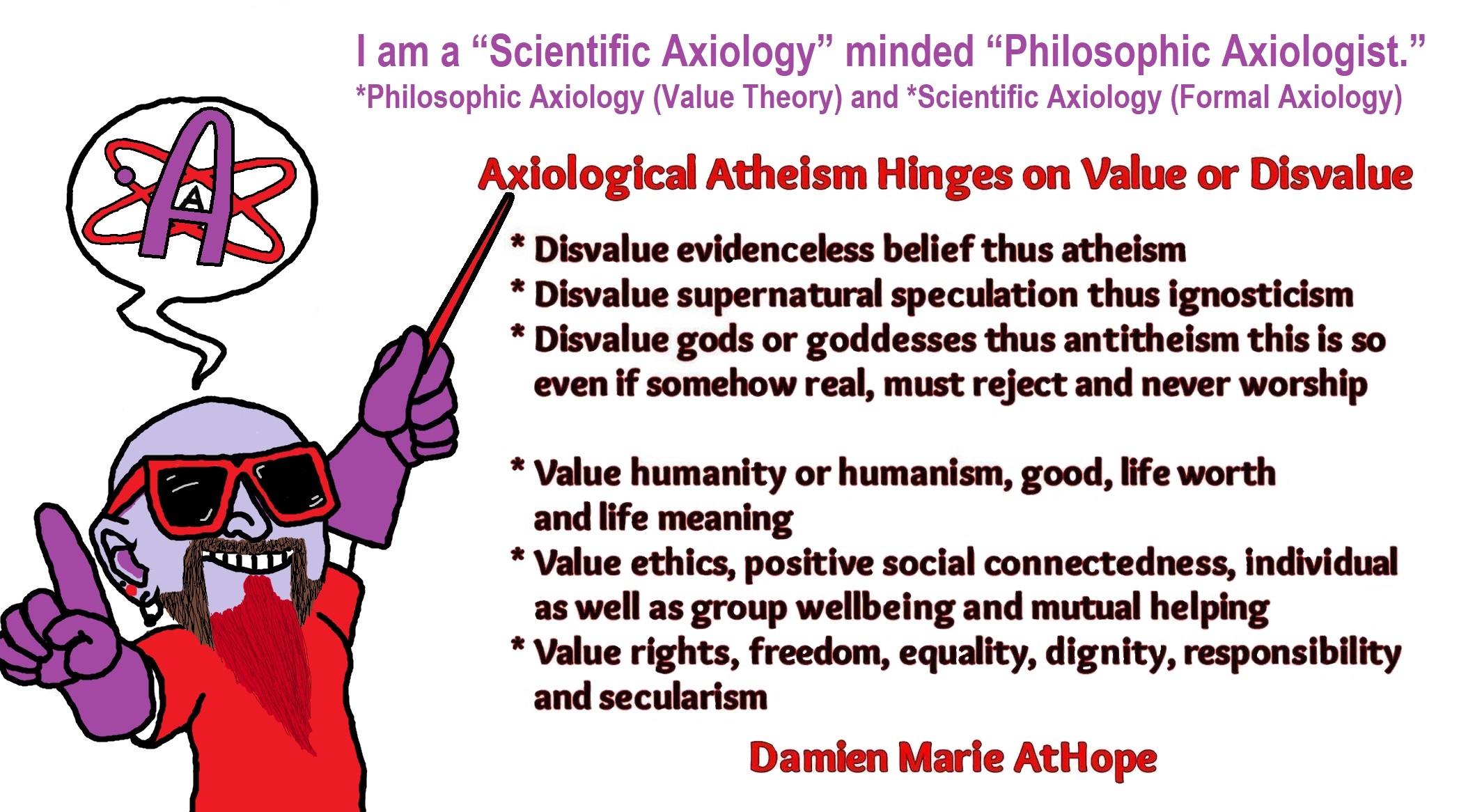
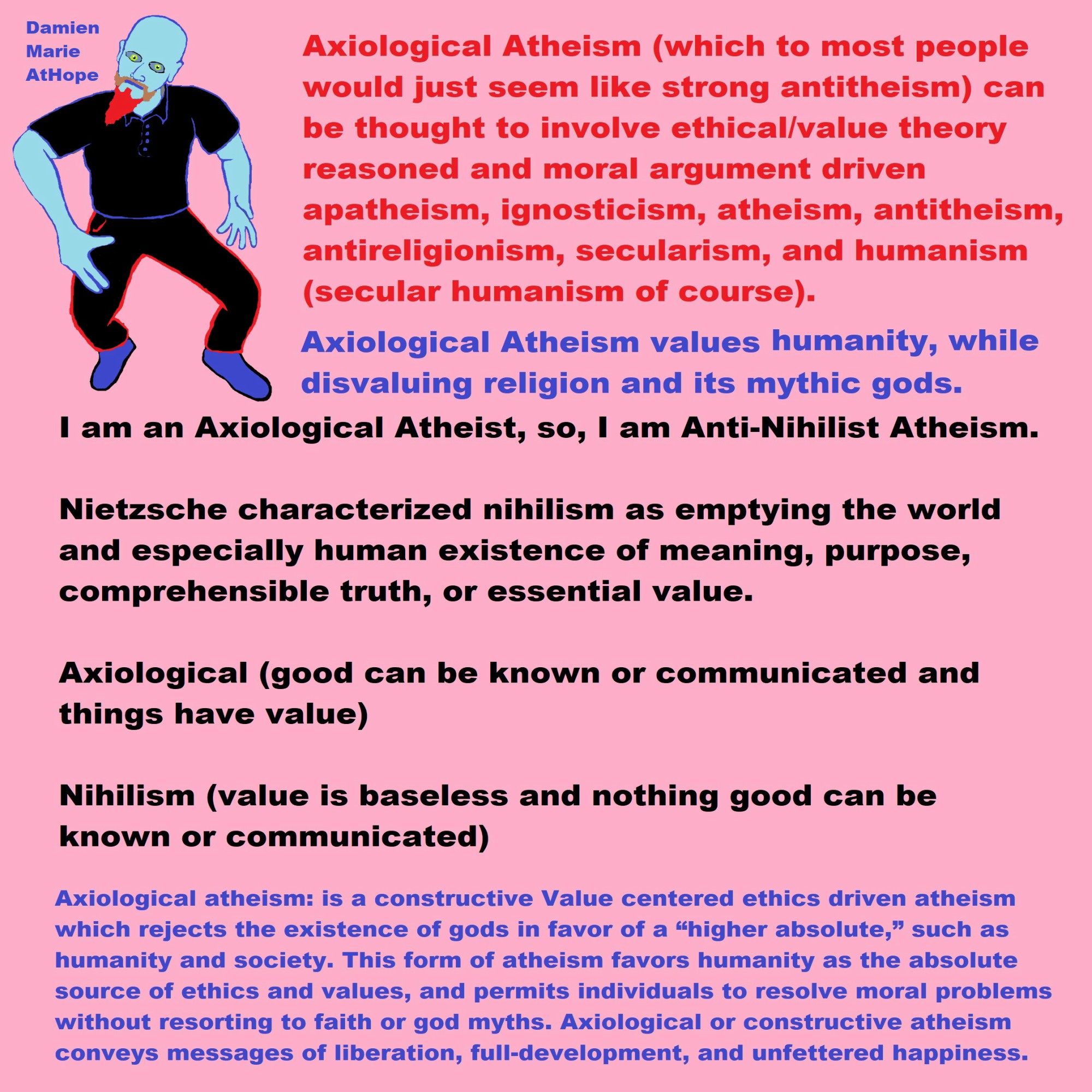
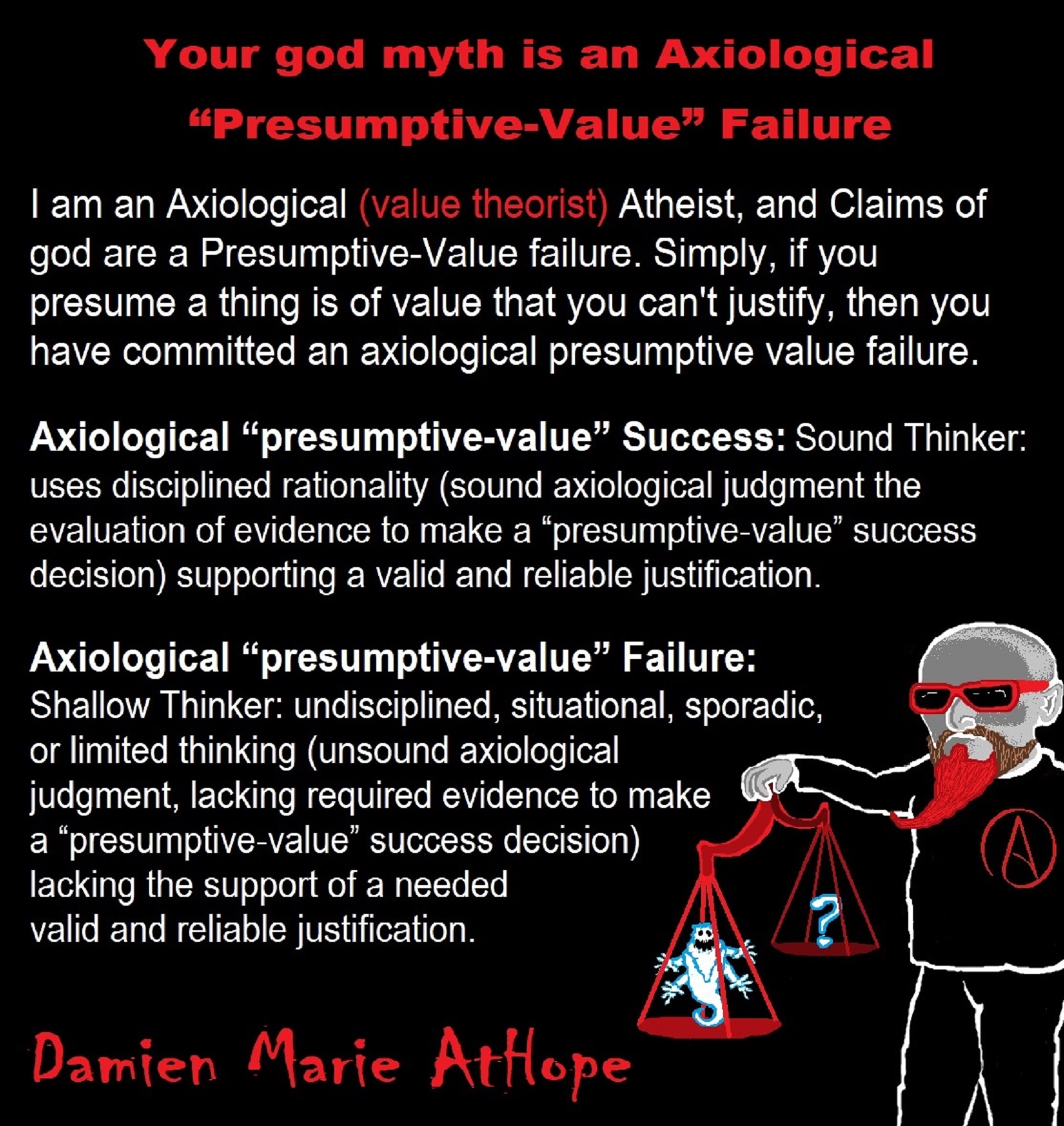
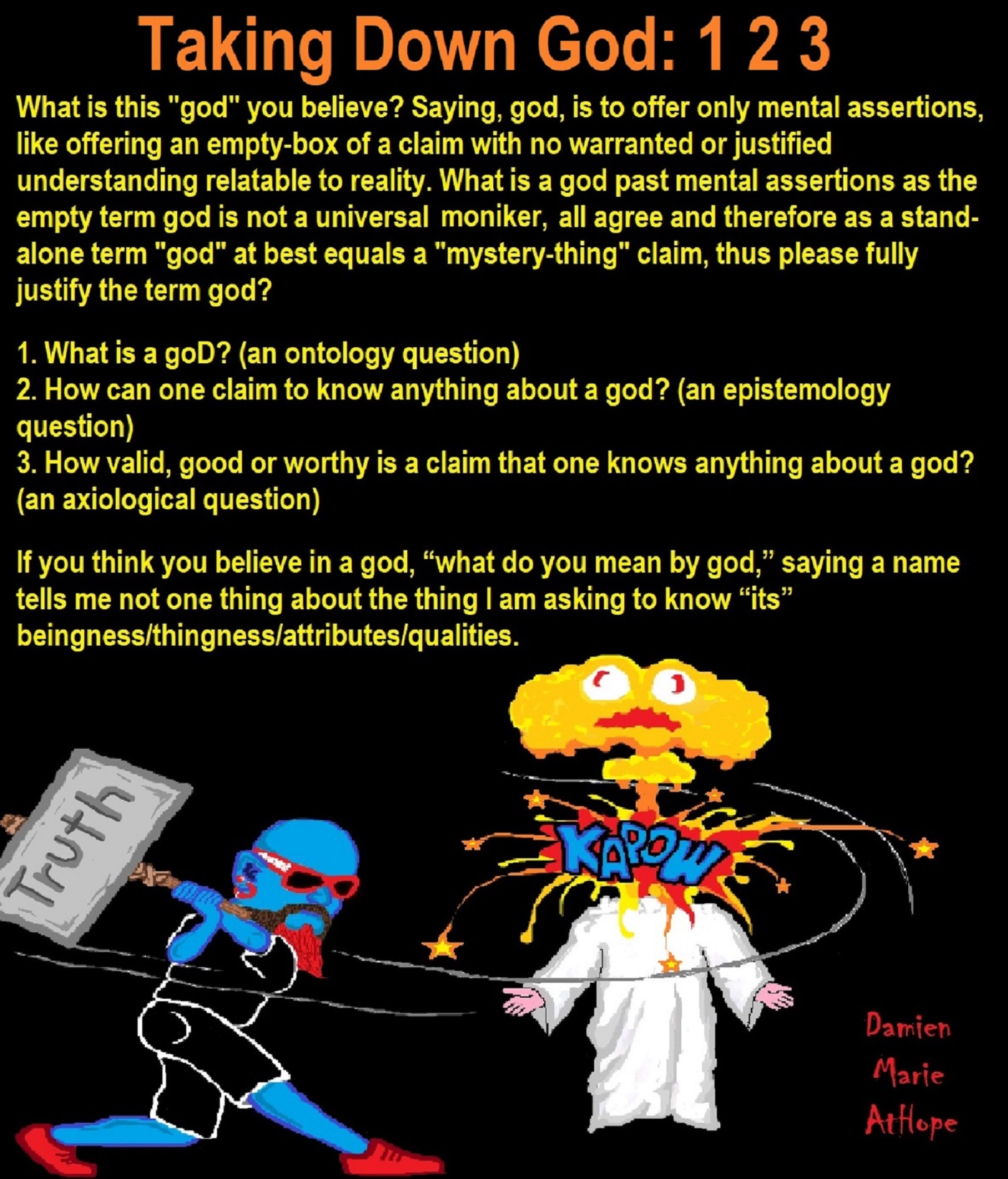
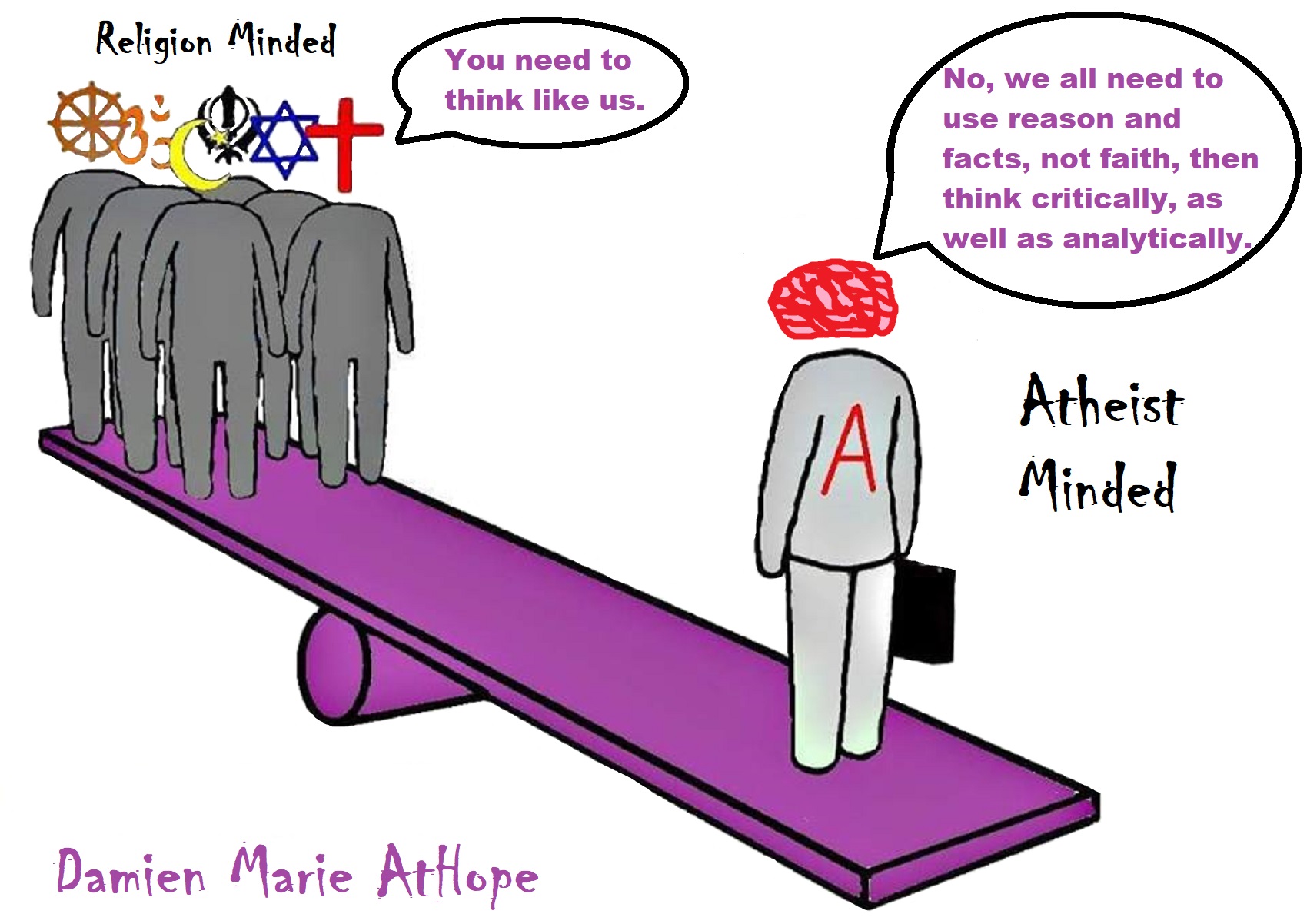
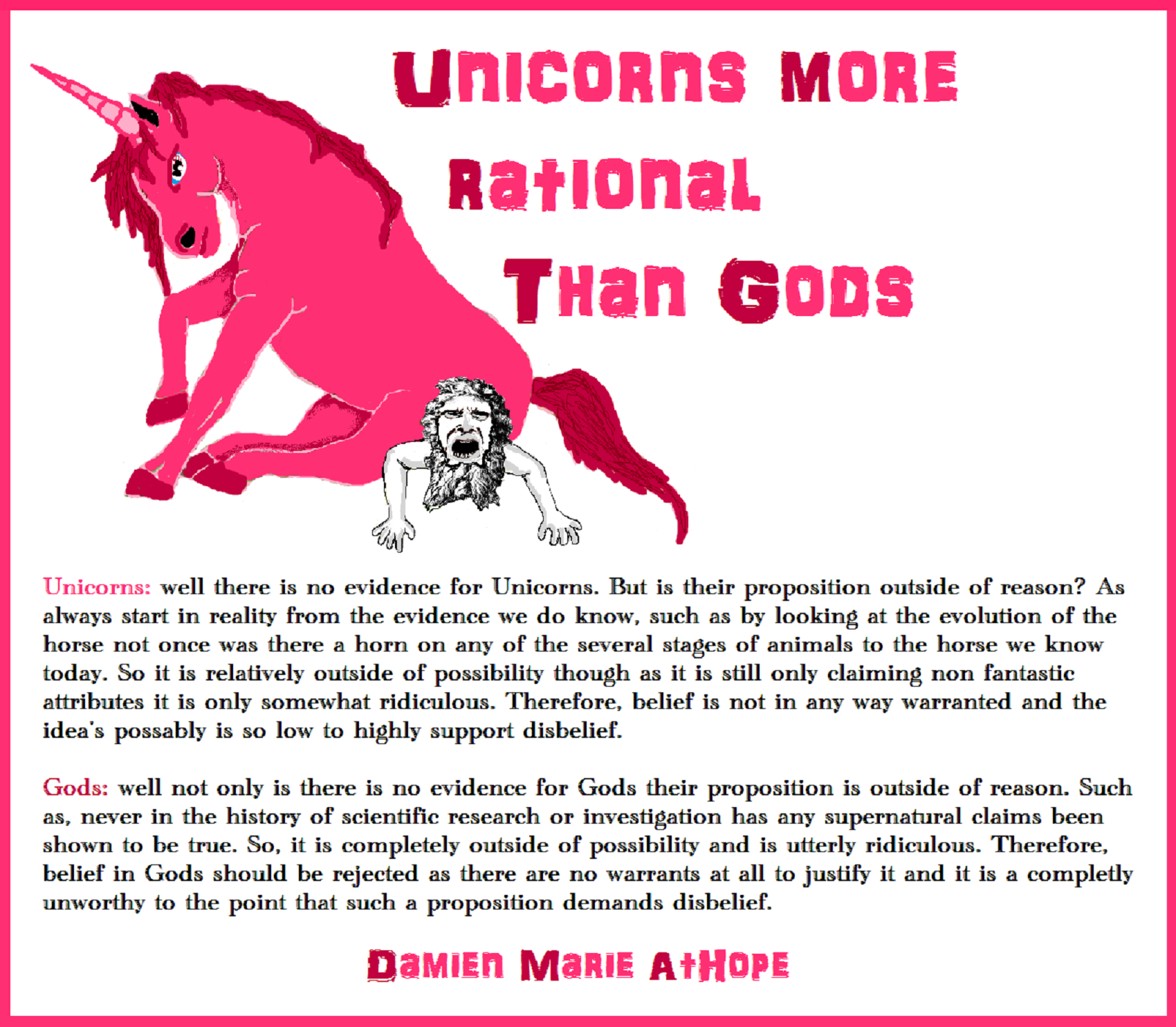
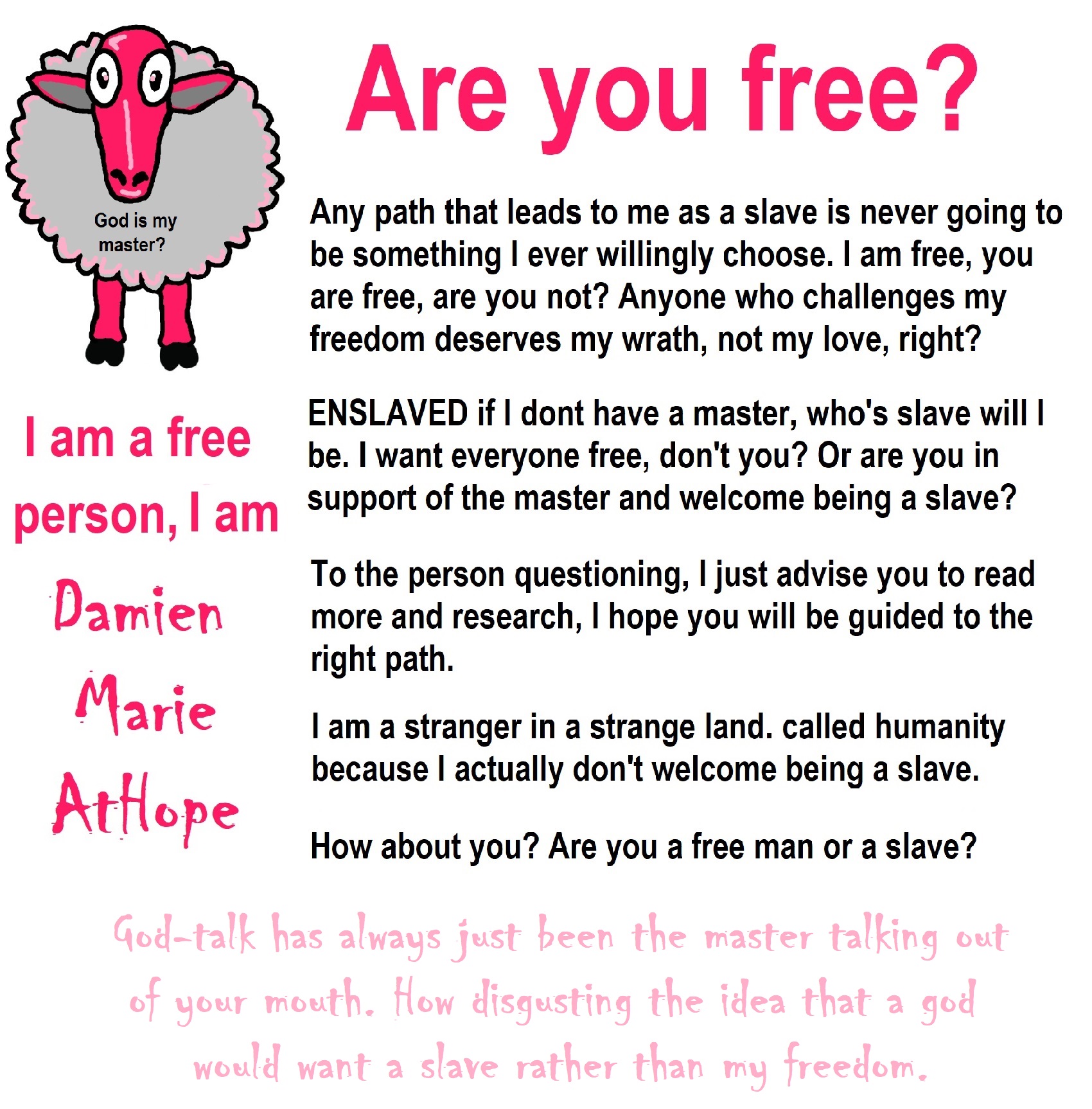
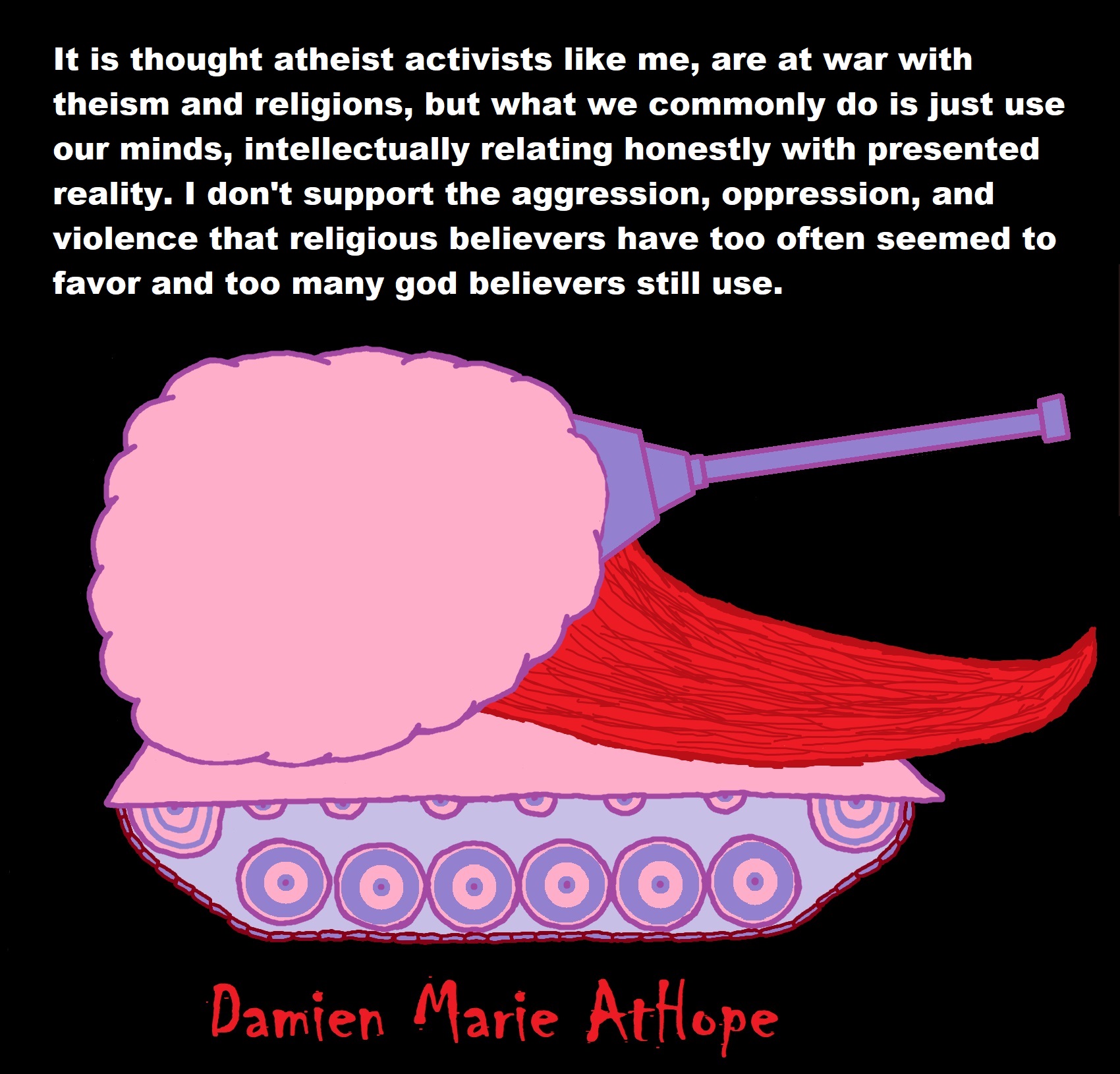

“Theists, there has to be a god, as something can not come from nothing.”
Well, thus something (unknown) happened and then there was something. This does not tell us what the something that may have been involved with something coming from nothing. A supposed first cause, thus something (unknown) happened and then there was something is not an open invitation to claim it as known, neither is it justified to call or label such an unknown as anything, especially an unsubstantiated magical thinking belief born of mythology and religious storytelling.


While hallucinogens are associated with shamanism, it is alcohol that is associated with paganism.
The Atheist-Humanist-Leftist Revolutionaries Shows in the prehistory series:
Show two: Pre-animism 300,000 years old and animism 100,000 years old: related to “Anarchism and Socialism”
Show tree: Totemism 50,000 years old: related to “Anarchism and Socialism”
Show four: Shamanism 30,000 years old: related to “Anarchism and Socialism”
Show five: Paganism 12,000 years old: related to “Anarchism and Socialism”
Show six: Emergence of hierarchy, sexism, slavery, and the new male god dominance: Paganism 7,000-5,000 years old: related to “Anarchism and Socialism” (Capitalism) (World War 0) Elite and their slaves!
Prehistory: related to “Anarchism and Socialism” the division of labor, power, rights, and recourses: VIDEO
Pre-animism 300,000 years old and animism 100,000 years old: related to “Anarchism and Socialism”: VIDEO
Totemism 50,000 years old: related to “Anarchism and Socialism”: VIDEO
Shamanism 30,000 years old: related to “Anarchism and Socialism”: VIDEO
Paganism 12,000 years old: related to “Anarchism and Socialism” (Pre-Capitalism): VIDEO
Paganism 7,000-5,000 years old: related to “Anarchism and Socialism” (Capitalism) (World War 0) Elite and their slaves: VIEDO
Paganism 5,000 years old: progressed organized religion and the state: related to “Anarchism and Socialism” (Kings and the Rise of the State): VIEDO
Paganism 4,000 years old: related to “Anarchism and Socialism” (First Moralistic gods, then the Origin time of Monotheism): VIEDO
I do not hate simply because I challenge and expose myths or lies any more than others being thought of as loving simply because of the protection and hiding from challenge their favored myths or lies.
The truth is best championed in the sunlight of challenge.
An archaeologist once said to me “Damien religion and culture are very different”
My response, So are you saying that was always that way, such as would you say Native Americans’ cultures are separate from their religions? And do you think it always was the way you believe?
I had said that religion was a cultural product. That is still how I see it and there are other archaeologists that think close to me as well. Gods too are the myths of cultures that did not understand science or the world around them, seeing magic/supernatural everywhere.
I personally think there is a goddess and not enough evidence to support a male god at Çatalhöyük but if there was both a male and female god and goddess then I know the kind of gods they were like Proto-Indo-European mythology.
This series idea was addressed in, Anarchist Teaching as Free Public Education or Free Education in the Public: VIDEO
Our 12 video series: Organized Oppression: Mesopotamian State Force and the Politics of power (9,000-4,000 years ago), is adapted from: The Complete and Concise History of the Sumerians and Early Bronze Age Mesopotamia (7000-2000 BC): https://www.youtube.com/watch?v=szFjxmY7jQA by “History with Cy“
Show #1: Mesopotamian State Force and the Politics of Power (Samarra, Halaf, Ubaid)
Show #2: Mesopotamian State Force and the Politics of Power
Show #3: Mesopotamian State Force and the Politics of Power (Uruk and the First Cities)
Show #4: Mesopotamian State Force and the Politics of Power (First Kings)
Show #5: Mesopotamian State Force and the Politics of Power (Early Dynastic Period)
Show #6: Mesopotamian State Force and the Politics of Power
Show #7: Mesopotamian State Force and the Politics of Power (Sargon and Akkadian Rule)
Show #9: Mesopotamian State Force and the Politics of Power (Gudea of Lagash and Utu-hegal)
Show #12: Mesopotamian State Force and the Politics of Power (Aftermath and Legacy of Sumer)

The “Atheist-Humanist-Leftist Revolutionaries”
Cory Johnston ☭ Ⓐ Atheist Leftist @Skepticallefty & I (Damien Marie AtHope) @AthopeMarie (my YouTube & related blog) are working jointly in atheist, antitheist, antireligionist, antifascist, anarchist, socialist, and humanist endeavors in our videos together, generally, every other Saturday.
Why Does Power Bring Responsibility?
Think, how often is it the powerless that start wars, oppress others, or commit genocide? So, I guess the question is to us all, to ask, how can power not carry responsibility in a humanity concept? I know I see the deep ethical responsibility that if there is power their must be a humanistic responsibility of ethical and empathic stewardship of that power. Will I be brave enough to be kind? Will I possess enough courage to be compassionate? Will my valor reach its height of empathy? I as everyone, earns our justified respect by our actions, that are good, ethical, just, protecting, and kind. Do I have enough self-respect to put my love for humanity’s flushing, over being brought down by some of its bad actors? May we all be the ones doing good actions in the world, to help human flourishing.
I create the world I want to live in, striving for flourishing. Which is not a place but a positive potential involvement and promotion; a life of humanist goal precision. To master oneself, also means mastering positive prosocial behaviors needed for human flourishing. I may have lost a god myth as an atheist, but I am happy to tell you, my friend, it is exactly because of that, leaving the mental terrorizer, god belief, that I truly regained my connected ethical as well as kind humanity.
Cory and I will talk about prehistory and theism, addressing the relevance to atheism, anarchism, and socialism.
At the same time as the rise of the male god, 7,000 years ago, there was also the very time there was the rise of violence, war, and clans to kingdoms, then empires, then states. It is all connected back to 7,000 years ago, and it moved across the world.
Cory Johnston: https://damienmarieathope.com/2021/04/cory-johnston-mind-of-a-skeptical-leftist/?v=32aec8db952d
The Mind of a Skeptical Leftist (YouTube)
Cory Johnston: Mind of a Skeptical Leftist @Skepticallefty
The Mind of a Skeptical Leftist By Cory Johnston: “Promoting critical thinking, social justice, and left-wing politics by covering current events and talking to a variety of people. Cory Johnston has been thoughtfully talking to people and attempting to promote critical thinking, social justice, and left-wing politics.” http://anchor.fm/skepticalleft
Cory needs our support. We rise by helping each other.
Cory Johnston ☭ Ⓐ @Skepticallefty Evidence-based atheist leftist (he/him) Producer, host, and co-host of 4 podcasts @skeptarchy @skpoliticspod and @AthopeMarie
Damien Marie AtHope (“At Hope”) Axiological Atheist, Anti-theist, Anti-religionist, Secular Humanist. Rationalist, Writer, Artist, Poet, Philosopher, Advocate, Activist, Psychology, and Armchair Archaeology/Anthropology/Historian.
Damien is interested in: Freedom, Liberty, Justice, Equality, Ethics, Humanism, Science, Atheism, Antiteism, Antireligionism, Ignosticism, Left-Libertarianism, Anarchism, Socialism, Mutualism, Axiology, Metaphysics, LGBTQI, Philosophy, Advocacy, Activism, Mental Health, Psychology, Archaeology, Social Work, Sexual Rights, Marriage Rights, Woman’s Rights, Gender Rights, Child Rights, Secular Rights, Race Equality, Ageism/Disability Equality, Etc. And a far-leftist, “Anarcho-Humanist.”
I am not a good fit in the atheist movement that is mostly pro-capitalist, I am anti-capitalist. Mostly pro-skeptic, I am a rationalist not valuing skepticism. Mostly pro-agnostic, I am anti-agnostic. Mostly limited to anti-Abrahamic religions, I am an anti-religionist.
To me, the “male god” seems to have either emerged or become prominent around 7,000 years ago, whereas the now favored monotheism “male god” is more like 4,000 years ago or so. To me, the “female goddess” seems to have either emerged or become prominent around 11,000-10,000 years ago or so, losing the majority of its once prominence around 2,000 years ago due largely to the now favored monotheism “male god” that grow in prominence after 4,000 years ago or so.
My Thought on the Evolution of Gods?
Animal protector deities from old totems/spirit animal beliefs come first to me, 13,000/12,000 years ago, then women as deities 11,000/10,000 years ago, then male gods around 7,000/8,000 years ago. Moralistic gods around 5,000/4,000 years ago, and monotheistic gods around 4,000/3,000 years ago.
To me, animal gods were likely first related to totemism animals around 13,000 to 12,000 years ago or older. Female as goddesses was next to me, 11,000 to 10,000 years ago or so with the emergence of agriculture. Then male gods come about 8,000 to 7,000 years ago with clan wars. Many monotheism-themed religions started in henotheism, emerging out of polytheism/paganism.
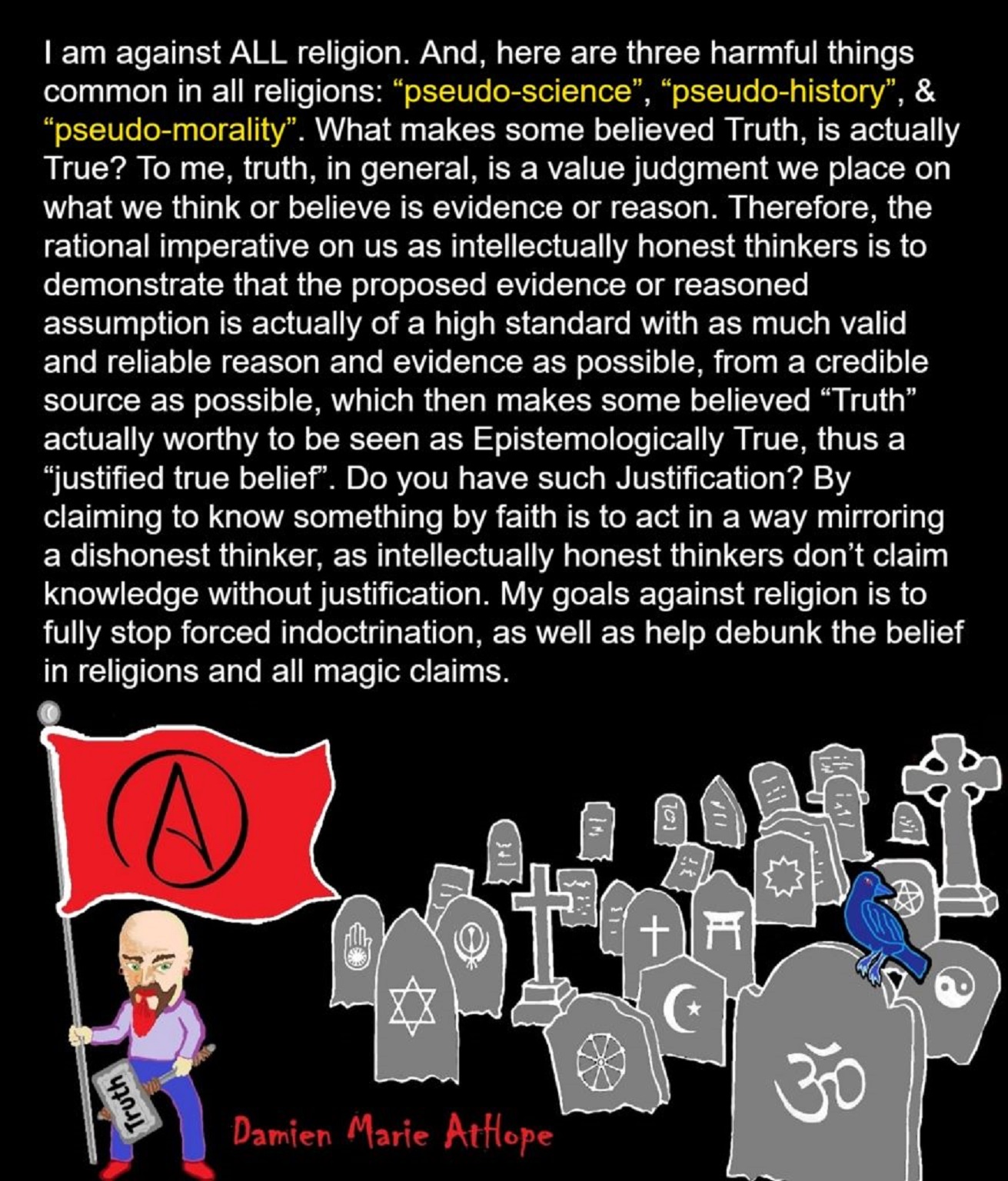

Damien Marie AtHope (Said as “At” “Hope”)/(Autodidact Polymath but not good at math):
Axiological Atheist, Anti-theist, Anti-religionist, Secular Humanist, Rationalist, Writer, Artist, Jeweler, Poet, “autodidact” Philosopher, schooled in Psychology, and “autodidact” Armchair Archaeology/Anthropology/Pre-Historian (Knowledgeable in the range of: 1 million to 5,000/4,000 years ago). I am an anarchist socialist politically. Reasons for or Types of Atheism
My Website, My Blog, & Short-writing or Quotes, My YouTube, Twitter: @AthopeMarie, and My Email: damien.marie.athope@gmail.com

